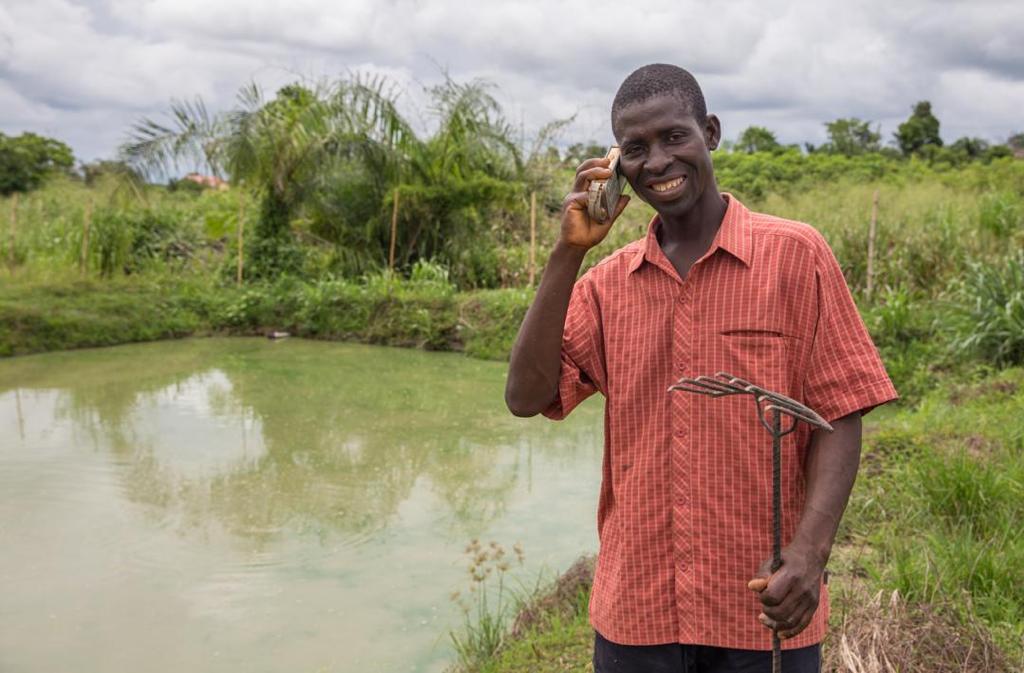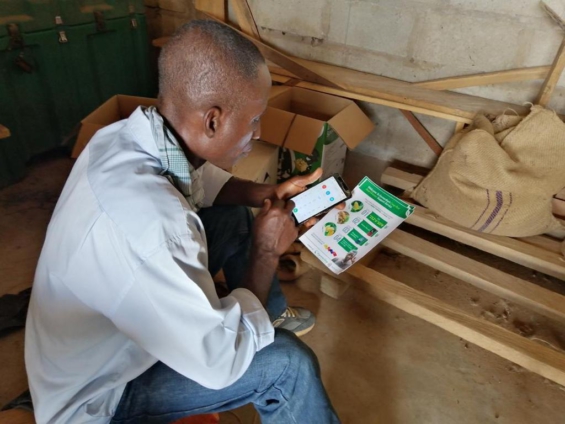Crop pests and diseases infestation poses an enormous and wide-scale risk to food security, the livelihoods of millions of African smallholders and economies.
In recent years, the Ghanaian economy has suffered huge losses due to crop pests and diseases affecting both staple crops and cash crops. For instance, the Fall armyworm (FAW), which immerged in Ghana in 2016 is causing major damage to maize crops and putting other staple crops at risk.
A total of 96.3% of farmers who experienced FAW had at least half of their farms infested. The country also lost about US$64 million in 2018 due to the infestation that affected about twenty thousand (20,000) hectares of farmlands.

The swollen shoot disease that affects cocoa, Ghana’s major export, is also reported to be a major cause of the reduction in cocoa production in Ghana. According to COCOBOD the disease could end the industry within the next four years if it is not controlled.
Farmers' challenges with diseases and pests
Smallholder farmers in rural areas in Ghana have limited access to the information and support they need to handle crop pests and diseases.
A study by the Africa Center for Economic Transformation said most farmers depend largely on word-of-mouth on use of agrochemicals and farming methods.
Also, Ghana’s Ministry of Food and Agriculture reported the ratio of the total extension officers to total farmer population to be 1:1850 in 2018. This means many farmers go about their farming activities with little guidance and insight into best practices that will increase their productivity and efficiency, like how to deal with pests and diseases on their farms.
Climate change also adds an additional burden on the management of crop pests and diseases on farms. The impact of climate change is the distribution, incidence, and intensity of crop pests by extreme weather events.
Agrochemicals like pesticides come in handy to help farmers to control pests and diseases on their farms. But for many farmers this is an expensive commodity that they cannot always afford in addition to information on the proper handling of them.
Access to affordable credit is largely unavailable because of lack of poor documentation of farmers’ economic activities.
Addressing challenges with pest and disease control
The Farmerline and Ausvet plant disease surveillance initiative.
In an effort to address these challenges, Farmerline in partnership with Ausvet, an Australian epidemiology company and with support from the Bill and Melinda Gates Foundation, is piloting a crop pest and disease diagnostic tool across 16 rural communities within the Sekyere- South and Mampong Districts in the Ashanti region of Ghana.
Mr. Worlali Senyo, a Senior Consultant for Corporate Services at Farmerline explains that the double-edged solution includes a crop pest and disease diagnostic tool, which helps farmers identify and manage crop pests and diseases on their farms, as well as a sustainable way of collecting data to generate insights on the prevalence of crop pests and diseases for the deployment of appropriate solutions.
Dr. Melanie Bannister-Tyrrel, a Senior Epidemiology Consultant at Ausvet explained how the system works.
“The diagnostic tool is activated by the farmer through an Interactive Voice Response (IVR) system when the farmer dials a toll-free USSD code. An immediate call from the system guides the farmer through a series of questions (in the farmer’s dialect) to identify signs of disease or crop pest infestations.”
After the call, she says the data is processed to identify the most likely diagnosis based on the reported signs. The farmer then receives a follow-up call advising on best management options on the reported signs and symptoms.
Mr. Emmanuel Addai, Chief Technical Officer at Farmerline, said, “What drives our work and impact is our ability to analyse data and use the insights to develop solutions that directly impact the productivity of smallholders.
"What is unique about our work with Ausvet is that we are delivering an e-extension service to help farmers diagnose and identify solutions for diseases, at the same time, we are developing models for using the data coming in through farmers’ complaints to estimate how common crop pests and diseases are in the area.
"Our goal is to be able to scale this solution across the country and build predictive models that can alert us in time about potential large scale infestations.”
This partnership brings together expertise in technology and epidemiology to help farmers and all players fight crop pests and diseases effectively and has both micro and macroeconomic benefits.
The predictive algorithms can help the country to become more food secure by ensuring early detection and control of aggressive crop pests like the fall armyworm.
Farmerline also uses data analytics to send location-specific weather updates to farmers through their mobile phones that help farmers to be climate-resilient.
The company also supports farmers to access inputs and markets through a flexible input credit scheme that provides farmers with quality fertilizers and agrochemicals that are competitive with flexible payment terms.
With the use of a credit scoring system, Farmerline is able to determine the creditworthiness of farmers who benefit from the scheme. Each farmer benefits from comprehensive training using a combination of in-person and technology approaches.
For many rural smallholder farmers like Alice Afriyie a cereal farmer in Kona Sekyere Odumase, the IVR system for plant disease surveillance is a game-changer that will enhance their swift response towards controlling infestations on their farms to improve yield and income. Alice said, wrong use of weedicides had caused her a lot and described Farmerline and Ausvet’s intervention as long overdue.
Latest Stories
-
Today’s front pages: Tuesday, April 23, 2024
1 min -
Siblings remanded over alleged missing penis
2 mins -
174 countries to gather in Ottawa for pivotal talks on plastic pollution
6 mins -
6 tiny tricks that make you immune to disappointment
8 mins -
Dumsor: Energy sector needs a leader, says Nana Amoasi VII
10 mins -
Reality zone with Vicky Wireko: Ending malaria: Optimism as world marks Malaria Day
13 mins -
Frema Opare supports Asanteman queen mothers with GH¢200k donation
4 hours -
Government is committed to connecting every region with rail line – Peter Amewu
4 hours -
Chief of staff appeals to Asantehene for support in Affirmative Action Bill passage
4 hours -
PAC orders Wa East DCE to release MP’s common fund with immediate effect
4 hours -
Ghana will not bear the cost of repairing faulty train – Railways Minister
5 hours -
You’re not an engineer; we inspected rail tracks before test run – Amewu tells Mahama
5 hours -
Photography, music and networking: Twinsdntbeg leads the way
6 hours -
Man, 20, electrocuted after heavy rainstorm in Central Tongu District
7 hours -
Four more grabbed and remanded over new train accident
7 hours

